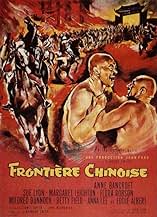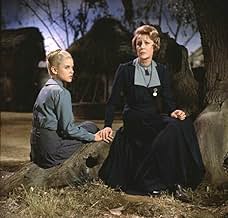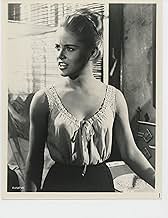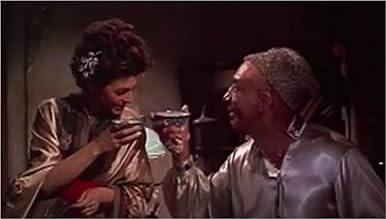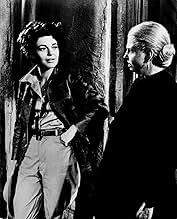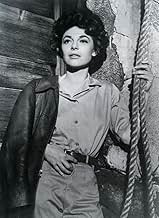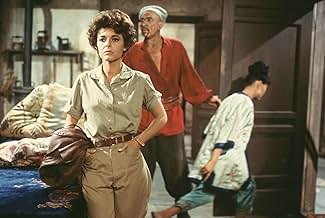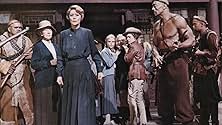AVALIAÇÃO DA IMDb
6,7/10
2,9 mil
SUA AVALIAÇÃO
Adicionar um enredo no seu idiomaIn 1935 China, seven dedicated missionary women try to protect themselves from the advances of a barbaric Mongolian warlord and his cut-throat gang of warriors.In 1935 China, seven dedicated missionary women try to protect themselves from the advances of a barbaric Mongolian warlord and his cut-throat gang of warriors.In 1935 China, seven dedicated missionary women try to protect themselves from the advances of a barbaric Mongolian warlord and his cut-throat gang of warriors.
- Direção
- Roteiristas
- Artistas
- Prêmios
- 1 indicação no total
Lee Kolima
- Warrior
- (não creditado)
- Direção
- Roteiristas
- Elenco e equipe completos
- Produção, bilheteria e muito mais no IMDbPro
Avaliações em destaque
For a film nut like me. 7 Women offers a plethora of pleasures. Patricia Neal was suppose to star but ill health made her unavailable. Anne Bancroft took over as the drinking, smoking, swearing saint. and all the aspects of this complex character are totally real in Anne Bancroft's face. She arrives to the Mission in China like a benevolent tornado. The spectacular Margaret Leighton is the head of the Mission and she plays it like a raw nerve, Among the other women, Flora Robson, Queen Elizabeth to Laurence Olivier's Michael Ingolby in Fire Over England, brings a voice of reason that reassure us, Betty Field , Kim Novak's mother in Picnic, among a gallery of memorable characters, plays the pregnant middle age woman who offends the Christian mission for having had sex with her husband under their roof. Mildred Dunnock, Anna Lee and even Stanley Kubrick's Lolita, Sue Lyon is part of the Mission. On the other side, the villains, that offended so many people, John Ford casts his longtime companion Woody Strode. I understand and even accept all the criticisms listed in the reviews of this pages but, somehow, I can put all that aside and enjoy the plethora of pleasures that it offers.
John Ford, usually with the reputation of misogynist, directed his last film surrounded by strong female characters and where the male characters are not particularly relevant. The movie is set in China, 1935, where a Civil War is taking place. Anne Bancroft, a female doctor who is also an atheist, says: "I spent years in slum hospitals. I never saw God come down and take care of anyone". Ford, with his catholic roots, allows himself to be pessimistic. Even when Margaret Leighton, a supposed strong believer is confronted by the female doctor, she says: "I've always searched for something that... isn't there. And God is not enough. God help me - He isn't enough".
The title refers to seven women, but the fact is that there are eight: What led us to believe that Anne Bancroft is excluded from the beginning? She wears man's clothes, she smokes and drinks. The loner Bancroft, condemned to always walk alone, like Ethan Edwards in "The Searchers". And what about the final scene, with a rare beauty, where the viewer isn't allowed to watch her fall? She is dressed in woman's clothes for the first time and is prepared to a truly catholic gesture, the sacrifice. "Seven Women" is a beautiful film, almost perfect. Towards the end, we become aware that Mr. Ford will live eternally.
The title refers to seven women, but the fact is that there are eight: What led us to believe that Anne Bancroft is excluded from the beginning? She wears man's clothes, she smokes and drinks. The loner Bancroft, condemned to always walk alone, like Ethan Edwards in "The Searchers". And what about the final scene, with a rare beauty, where the viewer isn't allowed to watch her fall? She is dressed in woman's clothes for the first time and is prepared to a truly catholic gesture, the sacrifice. "Seven Women" is a beautiful film, almost perfect. Towards the end, we become aware that Mr. Ford will live eternally.
Finished in 1965 and belatedly released a year later, 7 Women represents director John Ford's final bow on the silver screen after a long and extremely significant foray into the world of celluloid. Existing as something of an atypical swan song for the long renowned film-maker, the feature is one that suffers from an overall lack of ideas, but which also pulls this weakness to be its central force of power. Employing a recurring theme of empowerment in the face of defeat and a defiance of authority, blind-faith and outdated ideals, 7 women is at its heart, sixties film-making at its most empowering and critical. It may not be as elegant as other works of the decade, nor as moving, but blessed with a wonderful sense of character and performance, John Ford achieves one of his most significant works here with a piece of film that all things considered, should never be as such.
I say this, mainly, because 7 Women is something of a canned movie. In this vein, the feature, like a few of Ford's previous efforts, feels like a play rather than a movie. Through this minimalist tone, Ford strikes a stern focus on character and theme, rather than obtuse action or plot—two elements which could have easily been given the spotlight by any other film-maker had they chosen to. You see, telling the story of a small missionary camp set up in a civil-war-torn China during the late thirties, 7 Women finds its roots in theatre drama, yet also mixes an element of danger into the mix too, outside of any inherent character conflict (though, one could argue such plot devices are perfunctory and only serve merely as a catalyst to explore these characters more effectively). Under the attack of a rogue gang of savage bandits known for their pillaging, torture, rape and murder of several nearby missionary outposts, Ford attempts to bring out the absolute base levels of his characters—to put them under the microscope to see who they really are. The results are interesting, albeit predictable, yet the overall experience boils down to one of subtle reflection.
As mentioned above, and indeed more than made obvious by the movie's title, key to this somewhat somber approach is in the screenplay's devotion to character rather than plot; and what a character we have here. While ostensibly telling the story of the seven women staffed by the Catholic Church to help deliver these poor souls, the central point of Ford's story here instead chooses to focus on the black sheep of the bunch, Dr. Cartwright. Cartwright, played by an endlessly captivating Anne Bancroft, is a last-resort chain-smoking, binge-drinking, foul mouthed, pant-wearing doctor who would rather talk to the bottom of her glass than to the higher being in the sky everyone else around her seems content to confide in. Straight away Ford plays her as being as the misfit malcontent that she obviously would be in this situation, yet he does well to establish her as anything but incompetent with her duties. Following this theme through right to the movie's finest point (the very last scene which in itself is worth the ninety minutes that precede it), Dr. Cartwright ends up stealing the show at every turn—sure, there are ideas here about humanitarian needs outweighing those of a clergy (most of which are needlessly heavy-handed and all too frequent with no real penetration involved), and there are more than a few other interesting characters here, but for the most part 7 Women is much more the story of 1 Woman, and well, that's probably for the best.
This isn't to say that there's not much to see outside of this wonderful pairing of Ford and Bancroft; it's just that this will be what you no doubt will take away from the feature as being its most enjoyable aspect. And with that said, it's important to stress that while 7 Women may not be as wholly enjoyable or entertaining or indeed significant as some of Ford's previous work, it nevertheless manages to stand on its own two feet—much like our beloved Cartwright—without pandering to expectations either of its audience or of its society at the time. Much like many films of the sixties, 7 Women is a daring and often compelling look at ourselves, whether through our hopes and dreams, our loves and faiths or our demons and tragedies. Not only that but it's the final statement of a director that gave cinema many of its greatest hours, and in that vein, 7 Women gains some significance without ever sacrificing its distinctly restrained and quietly contemplative mood.
I say this, mainly, because 7 Women is something of a canned movie. In this vein, the feature, like a few of Ford's previous efforts, feels like a play rather than a movie. Through this minimalist tone, Ford strikes a stern focus on character and theme, rather than obtuse action or plot—two elements which could have easily been given the spotlight by any other film-maker had they chosen to. You see, telling the story of a small missionary camp set up in a civil-war-torn China during the late thirties, 7 Women finds its roots in theatre drama, yet also mixes an element of danger into the mix too, outside of any inherent character conflict (though, one could argue such plot devices are perfunctory and only serve merely as a catalyst to explore these characters more effectively). Under the attack of a rogue gang of savage bandits known for their pillaging, torture, rape and murder of several nearby missionary outposts, Ford attempts to bring out the absolute base levels of his characters—to put them under the microscope to see who they really are. The results are interesting, albeit predictable, yet the overall experience boils down to one of subtle reflection.
As mentioned above, and indeed more than made obvious by the movie's title, key to this somewhat somber approach is in the screenplay's devotion to character rather than plot; and what a character we have here. While ostensibly telling the story of the seven women staffed by the Catholic Church to help deliver these poor souls, the central point of Ford's story here instead chooses to focus on the black sheep of the bunch, Dr. Cartwright. Cartwright, played by an endlessly captivating Anne Bancroft, is a last-resort chain-smoking, binge-drinking, foul mouthed, pant-wearing doctor who would rather talk to the bottom of her glass than to the higher being in the sky everyone else around her seems content to confide in. Straight away Ford plays her as being as the misfit malcontent that she obviously would be in this situation, yet he does well to establish her as anything but incompetent with her duties. Following this theme through right to the movie's finest point (the very last scene which in itself is worth the ninety minutes that precede it), Dr. Cartwright ends up stealing the show at every turn—sure, there are ideas here about humanitarian needs outweighing those of a clergy (most of which are needlessly heavy-handed and all too frequent with no real penetration involved), and there are more than a few other interesting characters here, but for the most part 7 Women is much more the story of 1 Woman, and well, that's probably for the best.
This isn't to say that there's not much to see outside of this wonderful pairing of Ford and Bancroft; it's just that this will be what you no doubt will take away from the feature as being its most enjoyable aspect. And with that said, it's important to stress that while 7 Women may not be as wholly enjoyable or entertaining or indeed significant as some of Ford's previous work, it nevertheless manages to stand on its own two feet—much like our beloved Cartwright—without pandering to expectations either of its audience or of its society at the time. Much like many films of the sixties, 7 Women is a daring and often compelling look at ourselves, whether through our hopes and dreams, our loves and faiths or our demons and tragedies. Not only that but it's the final statement of a director that gave cinema many of its greatest hours, and in that vein, 7 Women gains some significance without ever sacrificing its distinctly restrained and quietly contemplative mood.
John Ford ended his narrative feature filmmaking career with something different, a story about women instead of men. It's a bit of a mixed bag of a film, showing a lot of the errant storytelling that had become more prevalent of Ford's film in his final decade, but a surprisingly stark ending helps elevate the material in a way that I had not been expecting. Reminding me of how Hitchcock went out with Family Plot, a smaller, lesser film that still managed to entertain while also demonstrating the strengths the filmmaker had developed over the decades.
In a remote mission in rural China, a group of women and one man teach the local children English and in the ways of Christ. One of them, Florrie (Betty Field), is pregnant, nearly due, and having been brought to the mission by her husband Charles (Eddie Albert). The head of the mission, Agatha (Margaret Leighton), has seen the need for a doctor, so she has arranged for the arrival of Dr. D. R. Cartwright (Anne Bancroft), who happens to be a woman, a twist Agatha had not foreseen. What seems like the undergirding conflict of the film will be between the deliriously religious Agatha against the sardonically secular Dr. Cartwright. It never really comes to fruition, though. It's set up so that Agatha and Dr. Cartwright will be duking it out rhetorically and morally for the soul of young Emma (Sue Lyon), the youngest of the missionaries.
What happens instead is a sudden outbreak of cholera after the battle lines of personality have been drawn. With the encroaching march of the Mongolian warlord Tunga Khan (Mike Mazurki), another British mission has abandoned their location and fled to the mission led by Agatha. With them came cholera, and Dr. Cartwright takes charge. She's assertive and action oriented, getting the mission moving in a way that can deal with the outbreak with minimal loss of life, and then it's suddenly over. We go from one scene where the outbreak is on the verge of being taken care of to a celebratory dinner (that Agatha insists on making dour while Cartwright insists on breaking open a bottle of scotch to celebrate) in a cut. I thought it was going to be a running plot element through the rest of the movie, and then it was suddenly over. Okay. Moving on.
That's the first half of the movie, and it's far from great. As a story unto itself, it's oddly built and unsatisfying. As the first half of what comes next, it's still curious but the basic story elements of Cartwright's character, the pregnancy, and the setting have been established well enough to go into what seems to become the point of the film. Tunga Khan arrives with his horde and takes up residence in the mission, Charles having been killed in the village when he tried to help a young girl being raped. He shoves the women into a wooden shed, and Cartwright needs to take charge as much as she can, especially when Florrie goes into labor. Cartwright becomes the face of the women when negotiating with Tunga Khan, offering up her own body as ransom for her medical supplies, hot water, and food.
It would have been better had Cartwright's character been a greater focus of the first half, though. There's little about why she came to rural China for a job. She talks about how women doctors aren't given opportunities to work and that she was also running from a failed relationship with a married man, but that's about it. I don't think enough is given to her early to make these early decisions terribly impactful. It's a strong moment from Bancroft, carrying the weight of her decision well, but I just think it could have been better set up.
This moves us into the film's finale where Cartwright essentially becomes Tunga Khan's prize, his queen. A good thing about this later section of the film is Khan himself. There's no good side to Khan. He's a barbarian and a monster, unrepentant about his crimes and even kills one of his own men (Woody Strode) in one-on-one combat just because. There's no negotiating with this man, no appealing to his humanity. His interest in human life is only what can profit him. So, Cartwright does what she can to provide the freedom of the other women, the titular seven. She gives herself fully to him.
Now, up to this point, I was kind of seesawing back and forth about the movie's worth as a whole, but then the final scene happened. I loved it. It was an ending both dark and hopeful at the same time. It goes to a place with Cartwright that feels just right after what she had gone through and seen in the second half. I think it saves the movie.
I've felt a certain fatigue in Ford's work as his career came to an end, but despite that exhaustion he still manages a solid little tale with his final narrative feature film. It may take until the final moments to push it to that level, but it does get there in the end.
In a remote mission in rural China, a group of women and one man teach the local children English and in the ways of Christ. One of them, Florrie (Betty Field), is pregnant, nearly due, and having been brought to the mission by her husband Charles (Eddie Albert). The head of the mission, Agatha (Margaret Leighton), has seen the need for a doctor, so she has arranged for the arrival of Dr. D. R. Cartwright (Anne Bancroft), who happens to be a woman, a twist Agatha had not foreseen. What seems like the undergirding conflict of the film will be between the deliriously religious Agatha against the sardonically secular Dr. Cartwright. It never really comes to fruition, though. It's set up so that Agatha and Dr. Cartwright will be duking it out rhetorically and morally for the soul of young Emma (Sue Lyon), the youngest of the missionaries.
What happens instead is a sudden outbreak of cholera after the battle lines of personality have been drawn. With the encroaching march of the Mongolian warlord Tunga Khan (Mike Mazurki), another British mission has abandoned their location and fled to the mission led by Agatha. With them came cholera, and Dr. Cartwright takes charge. She's assertive and action oriented, getting the mission moving in a way that can deal with the outbreak with minimal loss of life, and then it's suddenly over. We go from one scene where the outbreak is on the verge of being taken care of to a celebratory dinner (that Agatha insists on making dour while Cartwright insists on breaking open a bottle of scotch to celebrate) in a cut. I thought it was going to be a running plot element through the rest of the movie, and then it was suddenly over. Okay. Moving on.
That's the first half of the movie, and it's far from great. As a story unto itself, it's oddly built and unsatisfying. As the first half of what comes next, it's still curious but the basic story elements of Cartwright's character, the pregnancy, and the setting have been established well enough to go into what seems to become the point of the film. Tunga Khan arrives with his horde and takes up residence in the mission, Charles having been killed in the village when he tried to help a young girl being raped. He shoves the women into a wooden shed, and Cartwright needs to take charge as much as she can, especially when Florrie goes into labor. Cartwright becomes the face of the women when negotiating with Tunga Khan, offering up her own body as ransom for her medical supplies, hot water, and food.
It would have been better had Cartwright's character been a greater focus of the first half, though. There's little about why she came to rural China for a job. She talks about how women doctors aren't given opportunities to work and that she was also running from a failed relationship with a married man, but that's about it. I don't think enough is given to her early to make these early decisions terribly impactful. It's a strong moment from Bancroft, carrying the weight of her decision well, but I just think it could have been better set up.
This moves us into the film's finale where Cartwright essentially becomes Tunga Khan's prize, his queen. A good thing about this later section of the film is Khan himself. There's no good side to Khan. He's a barbarian and a monster, unrepentant about his crimes and even kills one of his own men (Woody Strode) in one-on-one combat just because. There's no negotiating with this man, no appealing to his humanity. His interest in human life is only what can profit him. So, Cartwright does what she can to provide the freedom of the other women, the titular seven. She gives herself fully to him.
Now, up to this point, I was kind of seesawing back and forth about the movie's worth as a whole, but then the final scene happened. I loved it. It was an ending both dark and hopeful at the same time. It goes to a place with Cartwright that feels just right after what she had gone through and seen in the second half. I think it saves the movie.
I've felt a certain fatigue in Ford's work as his career came to an end, but despite that exhaustion he still manages a solid little tale with his final narrative feature film. It may take until the final moments to push it to that level, but it does get there in the end.
John Ford's swan song is very underrated. Anne Bancroft plays a chain-smoking doctor who has fled the United States (for reasons unknown, unless they were explained during the minute or so I was away to answer the phone) to work at a mission in China. Margaret Leighton plays the head of this mission, a devout Christian who controls her underlings with strict rules. Various troubles ensue, the most prominent being the threat of a cholera epidemic, a raid by Mongolian bandits, and a pregnant woman who is nearing menopause, which makes the birth a very difficult situation. It is the second problem which I mention that takes up most of the plot. The mission has heard stories of these Mongolians in the nearby areas. Leighton is sure that they will never dare attack her mission, by the grace of God and America. But they do, and they keep all the white women hostage after killing off every Chinese person in sight. They believe that they can win a ransom for them. The tough Bancroft bravely opposes them, but she can make no headway by those means. Instead, the leader of the bandits demands sex. In this way, she is able to influence the way the women are treated (especially concerning the birth). The main conflict of the film is between Leighton and Bancroft. It's very 60s, with the progressive, liberated woman fighting against the strict, sexless one. The role of religion is very interesting in the film. It's shocking that Ford, a devout Catholic, would make the headmistress so foolish. It's a very intelligent criticism of the holier-than-thou attitude of some. When death looks imminent, Leighton seems almost excited to become a martyr; and she's willing and ready to take everyone else with her. When Bancroft sees her chance to save the others, Leighton viciously attacks her for being the "whore of Babylon." The final scene is quite excellent. What a great way for the greatest director of all time end his career.
Você sabia?
- CuriosidadesAnne Bancroft recalled producer and director John Ford's tearing pages out of the script and described him as "Marvelous but loony."
- Erros de gravaçãoDr. Cartwright's hairstyle is not out of place for 1935. Dr. Cartwright is a strong, independent woman and it is not unusual for her to have this type of hairstyle - see Amelia Earhart. Besides, short hair worn off the shoulder was a very popular style in the 1930s.
- Citações
Dr. D.R. Cartwright: [to Tunga Khan, Bandit Leader] So long, ya bastard!
- Cenas durante ou pós-créditosPROLOGUE: "1935: North China near the border of Mongolia...A land of feudal war lords and marauding bandit armies...A time of lawlessness and violence."
- ConexõesReferenced in MGM 40th Anniversary (1964)
- Trilhas sonorasJesus Loves Me
(uncredited)
Words by Anna B. Warner and David Rutherford McGuire
Music by William B. Bradbury
Sung by Sue Lyon and the children
Principais escolhas
Faça login para avaliar e ver a lista de recomendações personalizadas
- How long is 7 Women?Fornecido pela Alexa
Detalhes
- Data de lançamento
- País de origem
- Idiomas
- Também conhecido como
- Sete Mulheres
- Locações de filme
- Empresas de produção
- Consulte mais créditos da empresa na IMDbPro
Bilheteria
- Orçamento
- US$ 2.300.000 (estimativa)
- Faturamento bruto mundial
- US$ 228
- Tempo de duração
- 1 h 27 min(87 min)
- Cor
- Proporção
- 2.35 : 1
Contribua para esta página
Sugerir uma alteração ou adicionar conteúdo ausente


